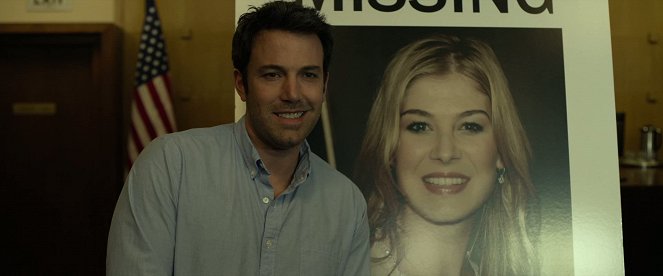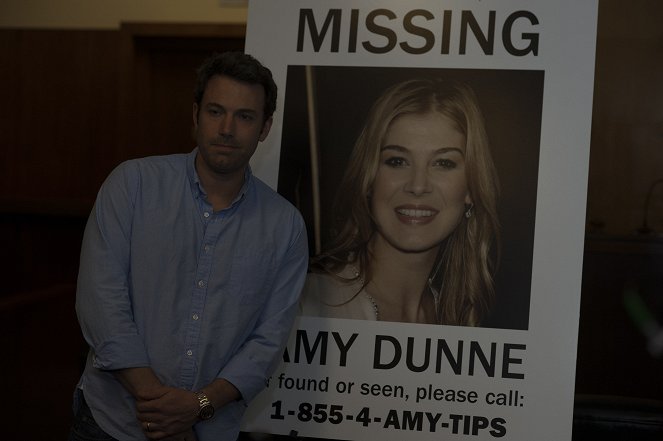Réalisation:
David FincherScénario:
Gillian FlynnPhotographie:
Jeff CronenwethActeurs·trices:
Ben Affleck, Rosamund Pike, Neil Patrick Harris, Tyler Perry, Carrie Coon, Kim Dickens, Patrick Fugit, David Clennon, Lisa Banes, Missi Pyle (plus)VOD (5)
Résumés(1)
À l'occasion de son cinquième anniversaire de mariage, Nick Dunne (Ben Affleck) signale la disparition de sa femme, Amy (Rosamund Pike). Sous la pression de la police et l'affolement des médias, l'image du couple modèle commence à s'effriter. Très vite, les mensonges de Nick et son étrange comportement amènent tout le monde à se poser la même question : a-t-il tué sa femme ? (20th Century Fox FR)
(plus)Vidéo (2)
Critiques (17)
Mosaïque d'événements perfectionniste et compacte. Chirurgicalement confiante, parfaitement synchronisée dans chaque scène, dans chaque plan. C'est précisément pourquoi, et en raison de mon admiration pour le talent de Fincher, il est dommage qu'il soit si froid et impersonnel en même temps. Qu'il ne permette pas au spectateur de s'y impliquer et en fasse juste un observateur. C'est une partie du jeu du maître, mais c'est dommage. Trent Reznor et Atticus Ross ont autrefois donné une identité musicale au monde des héros qui ont construit un phénomène Internet à partir de zéros et de uns. Original et efficace. Mais que fait leur bulle chimique dans l'histoire de la relation entre deux personnes? Gone Girl ne serait-il pas un meilleur film s'il était animé par la passion et les émotions? C'est un film sur la rupture d'une relation conjugale et il a la même esthétique audiovisuelle que le thriller de Soderbergh sur une épidémie mondiale mortelle...
()
Who wouldn't want to open their wife's skull and see what's going on inside it? Best Fincher since 2007. Especially the first half is brilliant. The way in which Fincher managed to elegantly embody two unreliable book narrators into exciting cinematic speech is worthy of (un) academic admiration. Especially since the film does not achieve the stratification and urgency of the book, but it is able to balance it with predatory irony and scathing exaggeration. Criticism of the crises of a troubled society, which is oriented only by reflections and media images, is carried out with ease and without any lameness. I have problems more so with the second half, which is slightly camp, and, especially through the irresistibly psychopathic caricature of the main character, the film makes its work a little easier when it runs from subtle social criticism and attentive satire of a marital crisis to shocking twists. Moreover, in some of the "dark" scenes, it seems as if Ben Affleck (deprived of the opportunity to defend himself with his smile) reaches the limits of his acting. I can't say that Fincher convinces me indefinitely about the meaningfulness of all of the parts of his game, but I admit, without torture, that even taking into account the complexity of the original and all the pitfalls of the material, my initially slightly indifferent attitude transformed into deep recognition. I’d like to watch this Gone Bitch again after some time has passed.
()
Gone Girl is a really good atmospheric drama, the kind probably only David Fincher can make. But that’s my problem – whenever I see Fincher and a thriller, I expect something in the vein of Seven. But as opposed to this flick, everything about Seven was perfect. In this case, the movie is close to perfect, which is also why I was originally going to give it a five-star review. But as time went on, I decided to take one star off because there were things in the movie that messed up the perfection. Take for instance Neil Patrick Harris. His character was good, but I’d never cast him into a serious thriller like this. He simply doesn’t belong into movies like that, no matter how hard he tries. You may have noticed that nobody even mentions him here. By contrast, Rosamund Pike puts in a performance that will be really hard to ever to surpass for her. I hadn’t seen such a good performance in a long time and I will not forget it any time soon, if ever. Despite her perfect performance, you still have Ben Affleck, about whom I really don’t know what to think. I definitely wouldn’t say he’s stiff, which is what a lot of people here are saying, I simply didn’t know where to put him. It seemed to me he had no opinions of his own and I still feel the same way. Well, and these three actors portray probably the three most important characters in the movie. And that’s where it all starts from and also what it lives and dies with. As regards the story, it’s absolutely clear to me why Fincher had picked it. The same way it was clear to me why he’d picked the ‘Millennium Trilogy’. It’s obvious that he likes stories like these. He simply loves the unexpected twists. Let me just add that this movie didn’t get five stars because the ending was cut off unnecessarily fast. I would have expected some kind of conclusion that would knock me off my feet and that I could keep thinking about without having to get back to the movie as a whole. Simply some knock-out ending. Something similar to what you get in Shutter Island. Unfortunately, that didn’t happen, hence the four-star review. At the same time, I think that it is one of the best movies Fincher has ever made. If he just went on making movies like this, I wouldn’t mind at all.
()
Spoilers ahead. A five-act play about marriage and engaging storytelling. The film not only preserves the book’s “he said/she said” structure, but further thematises the telling of various versions of the same story through words and images. From the storytelling perspective, Gone Girl is notable in both how the film communicates with the viewer and how the individual narrative segments communicate with each other. One gets the impression that the information in Amy’s diary is a response to what Nick is experiencing and vice versa. The diary flashbacks trigger events in the present (the discovery of Amazing Amy’s artifacts) and the returns to the present are handled with fluid graphic transitions (the kiss – wiping of the mouth), thanks to which the shots organically complement each other. As the co-creator of Nick’s story, Amy is thus seemingly present even in scenes in which she does not physically appear (in the book, this impression is achieved through Nick’s feeling that Amy is looking over his shoulder and commenting on the text of the novel that he is writing). Thanks to the “cooperation” between the information from the past and that from the present, both storylines can serve to convey evidence supporting the intensification of the police investigation (which Flynn does not needlessly delay here, making better use of it than in the book to tighten up the narrative). Similar communication takes place at a higher level between the first and second parts of the film. In the second part, there are variations on scenes from the first part, with a different allocation of the roles of prey and predator (first Nick and then Amy suspects that someone is moving around in front of the house) and different motivations for their actions (the goal of “finding Amy” remains, but until the final act, it is not her life that is in danger, but Nick’s). ___ Like the composition of some of the shots, which are terrifying in how inhumanly perfectly centred they are, the similarity of whole scenes is confirmation of Fincher’s obsession with symmetry. Even so, I don’t consider the moral relativism of either the book or the film to be as well-honed as their creators would have liked. Against a sadomasochistic sociopath and murderer stands a rather ordinary guy who “only” lies, treats his own father like shit and has been unfaithful to his wife. ___ I suspect that the negative depiction of the female protagonist was the reason that the book appealed to Fincher. Nevertheless, women who have been betrayed may feel a certain satisfaction from the fact that Amy exclusively uses feminine weapons to symbolically castrate her husband (for which we are prepared by Go’s “Protect Your Nuts” T-shirt in the opening scene). Her power does not consist in thinking and acting like a man. ___ Fincher’s handling of the audio-visual form of every shot is more masterful from film to film. Minor adjustments in colour, pacing and shot size are used to adapt the overall noirish atmosphere with cold colours into a clinical police procedural here, a toxically cynical relationship satire there (along the lines of Who's Afraid of Virginia Woolf?) and even a splatter flick. Instead of switching between thriller, biting social commentary and dark comedy, these individual types are layered on top of each other, so that we can view each scene from multiple (genre) perspectives and admire the precision with which Fincher takes care to ensure that none of the genres dominates and that the viewer cannot experience the satisfaction that comes with the fulfilment of a particular formula. The ending is as unsatisfying (in the sense of not being a typical Hollywood ending) as what the film says about certainty in marriage and honesty in relationships generally. 85%
()
(moins)
(plus)
Bitching about Fincher playing it safe is like badmouthing Jagr for his hockey finesse and scoring goals. This narrative, directed with the precision of a neurosurgeon, for whom the camera is the scalpel and the music the anesthetic, precisely doses the marital crisis with a cool detachment, in which the apparent waters of detachment are navigated by actors who have every letter of the script pinned directly to their bodies. Affleck's worldliness with the hallmark of a small-town dweeb works, but Rosamund Pike reigns supreme. Their interaction is something you experience on screen once or twice every three years. It’s a perfectly polished film that knows it and isn't ashamed of it. The first and last shots are divine.
()



Annonces